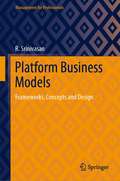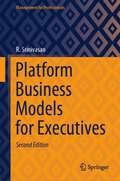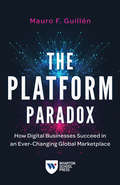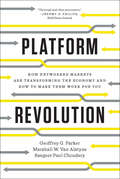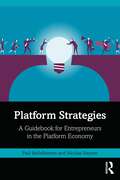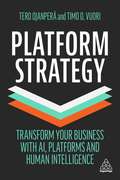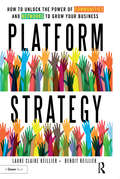- Table View
- List View
Platform Business Models: Frameworks, Concepts and Design (Management for Professionals)
by R. SrinivasanThis book introduces platform firms as unique business models. Leveraging on the early literature on network economics and strategy frameworks, this book explores how platform business firms evolve in the modern business world. Taking a strategic perspective, this book engages the reader with core concepts, case studies, and frameworks for analyzing platform business firms. This book differentiates platform business firms from traditional pipeline firms; explores engagement with different actors, value creation, and operations of platforms; elucidates resources and capabilities of platform firms that provide them sustained competitive advantage; analyzes performance levers in operating platform business models, including complementarities with other business models; and discusses the sustainability of platform business models, in the face of regulatory and societal challenges, among others. The book is designed as a primer for entrepreneurs setting up and operating platform business firms, senior managers in large corporations repurposing their resources to initiate network dynamics in their businesses, early career managers, and professionals engaging with myriad platform firms for their professional and personal needs. This book intends to provide a decision-maker with a portfolio of decisions to make to create, operate, sustain, and generate value out of a platform business firm. It is also useful for policy professionals to appreciate the economics and policy implications of regulating and governing platforms in a post-digital world.
Platform Business Models for Executives (Management for Professionals)
by R. SrinivasanThis book takes a practice approach to studying platform business models. Drawing from the growing academic literature as well as the practice world, this book intends to provide a framework for analysing platform business firms. Leveraging on the early literature on network economics (that was largely analytical) and the popular writing about new organizations, this book takes a strategic perspective. It answers the five big strategy questions about platform business firms: a. What are platform business models, and how are they different from others; b. How do platform business firms operate, and what value do they create? To whom and how; c. What are those resources that platforms possess and leverage to create and sustain their competitive advantage over others; d. Why and how are they successful? Why do they perform differently from others? What metrics of performance should we use to study and analyse their performance; e. Is this business model sustainable? What determines the longevity of such firms? What are the regulatory and social challenges that these platform business firms face? How do regulators and the larger society manage the disproportionate power distribution among such firms?The book is strategic in nature and highlights the resources defining the strategies of successful platform business firms. In doing so, it provides a field guide for entrepreneurs and managers embarking on building a platform, by providing a portfolio of decisions to make. Though the frameworks could be generalized, the book focuses on platform businesses, rather than societal platforms. With a few extensions, it is possible that these frameworks could be easily applied to non-profit and or social enterprises as well.
Platform Coring on Digital Software Platforms (Schriften zur Business Analytics und zum Informationsmanagement)
by Benedict BenderDigital software platforms such as iOS or Android evolve quickly. Through regular updates, their set of built-in (core) features increases. While innovation allows strengthening platforms amidst competition, it can hurt contributors when introducing core features that are already provided by third-party developers (Platform Coring).This book addresses the underexplored phenomenon of Platform Coring and provides strategical guidance for platform owners and third-party contributors. Platform owners are well-advised to carefully consider the benefits and risks for their platform ecosystem.The book contributes by highlighting avenues to employ Platform Coring for the competitive advantage of the platform and ecosystem simultaneously.
The Platform Delusion: Who Wins and Who Loses in the Age of Tech Titans
by Jonathan A. KneeAn investment banker and professor explains what really drives success in the tech economyMany think that they understand the secrets to the success of the biggest tech companies: Facebook, Amazon, Apple, Netflix, and Google. It's the platform economy, or network effects, or some other magical power that makes their ultimate world domination inevitable. Investment banker and professor Jonathan Knee argues that the truth is much more complicated--but entrepreneurs and investors can understand what makes the giants work, and learn the keys to lasting success in the digital economy.Knee explains what really makes the biggest tech companies work: a surprisingly disparate portfolio of structural advantages buttressed by shrewd acquisitions, strong management, lax regulation, and often, encouraging the myth that they are invincible to discourage competitors. By offering fresh insights into the true sources of strength and very real vulnerabilities of these companies, The Platform Delusion shows how investors, existing businesses, and startups might value them, compete with them, and imitate them.The Platform Delusion demystifies the success of the biggest digital companies in sectors from retail to media to software to hardware, offering readers what those companies don't want everyone else to know. Knee's insights are invaluable for entrepreneurs and investors in digital businesses seeking to understand what drives resilience and profitability for the long term.
The Platform Economy: Designing a Supranational Legal Framework
by Maxim I. Inozemtsev Elina L. Sidorenko Zarina I. KhisamovaDigital ecosystems formed on the basis of digital platforms are significantly transforming modern reality. Today it is difficult to imagine life without LinkedIn, Facebook, or Amazon. The total income generated by them is estimated at trillions of dollars. Digital platforms are the main driving force of the digital economy. The impact and growth of digital platforms on social and economic processes today is difficult to overestimate. The pandemic has further deepened their influence on society, as almost all social communication and economic activity has moved to online format on digital platforms. The growth of the share of digital platforms in various segments of the economy was so rapid that regulators around the world were not ready for such large-scale transformations. All this has caused a number of crisis phenomena, when IT giants have grown into an independent branch of “power”, which has direct access to the personal and financial data of millions of citizens, and moreover, have the opportunity to directly influence them. This monograph is a unique publication in which, for the first time, a large-scale and sufficiently deep team of experts and scientists from various countries of the world studied in detail the multidimensional phenomenon of the “platform economy” and the measures taken by states to regulate these processes. The book will be interesting to a wide range of readers interested in the problems of the development of digital platforms and the developing branch of law and science – the law of digital platforms.
Platform Engineering
by Camille Fournier Ian NowlandUntil recently, infrastructure was the backbone of organizations operating software they developed in-house. But now that cloud vendors run the computers, companies can finally bring the benefits of agile custom-centricity to their own developers. Adding product management to infrastructure organizations is now all the rage.But how's that possible when infrastructure is still the operational layer of the company?This practical book guides engineers, managers, product managers, and leaders through the shifts required to become a modern platform-led organization. You'll learn what platform engineering is "and isn't" and what benefits and value it brings to developers and teams. You'll understand what it means to approach your platform as a product and learn some of the most common technical and managerial barriers to success.With this book, you'll:Cultivate a platform-as-product, developer-centric mindsetLearn what platform engineering teams are and are notStart the process of adopting platform engineering within your organizationDiscover what it takes to become a product manager for a platform teamUnderstand the challenges that emerge when you scale platformsAutomate processes and self-service infrastructure to speed development and improve developer experienceBuild out, hire, manage, and advocate for a platform team
Platform Labour and Global Logistics: A Research Companion (Routledge Research Companions in Business and Economics)
by Immanuel NessOver the past 50 years the global labour market is transforming from reliable employment to low-wage and unstable informal and precarious jobs. This ineluctable shift is a consequence of the concentrated application of neoliberalism since the 1980s, as capitalism is converting standardised labour markets in the developed Global North into contingent and informal labour. Platform Labour and Global Logistics: A Research Companion examines the most important developments and features of global logistics and the emergence of the platform economy through historical comparative chapters and case studies. Part I surveys the logistics revolution and its impact on labour in key sectors of the global economy and probes the viability of the platform as a generator of economic and financial growth and innovation. The chapters of Part 1 offer a fulsome analysis and critique of the economic and technical reconfiguration brought on by neoliberal capitalism and the diffusion of the platform and logistics as a feasible model into the future. Part II examines labour restructuring from standardized to informal work through the platform and information technology, and the political and environmental challenges to labour. Part III provides global case studies on the informal economy through case studies of crucial economies where the platform has become dominant, and Part IV examines how the platform has contributed to geographic mobility and labour migration, and the consequences on workers. Platform Labour and Global Logistics: A Research Companion presents a unique contribution to the political economy literature through highlighting the significance of the impact of the platform and logistics on the working class and potential challenges from labour across the world. This book is intended for academics, researchers and students studying technological innovation, global supply chains, labour restructuring, and worker resistance.
Platform Neutrality Rights: AI Censors and the Future of Freedom (Routledge Research in Information Technology and E-Commerce Law)
by Hannibal TravisThis book analyzes questions of platform bias, algorithmic filtering and ranking of Internet speech, and declining perceptions of online freedom.Courts have intervened against unfair platforms in important cases, but they have deferred to private sector decisions in many others, particularly in the United States. The First Amendment, human rights law, competition law, Section 230 of the Communications Decency Act, and an array of state and foreign laws address bad faith conduct by Internet platforms or other commercial actors. Arguing that the problem of platform neutrality is similar to the net neutrality problem, the book discusses the assault on freedom of speech that emerges from public-private partnerships. The book draws parallels between U.S. constitutional and statutory doctrines relating to shared spaces and the teachings of international human rights bodies relating to the responsibilities of private actors. It also connects the dots between new rights to appeal account or post removals under the Digital Services Act of the European Union and a variety of fair treatment obligations of platforms under American and European competition laws, “public accommodations” laws, and public utilities laws. Analyzing artificial intelligence (AI) regulation from the point of view of social-media and video-platform users, the book explores overlaps between European and U.S. efforts to limit algorithmic censorship or “shadow-banning”.The book will be of interest to students and scholars in the field of cyberlaw, the law of emerging technologies and AI law.
The Platform of Agile Management: And the Program to Implement It
by Willy SusslandFacing the amplitude and the acceleration of changes, management must also change, and it must become alert, adaptable, and agile. The children of the Internet, the likes of Google, Amazon, Facebook and Tesla, are born agile, and they challenge the traditional organizations that have long lost their original agility. The latter may have innovated externally i.e. on the market-oriented part of their organization. Yet, internally their mindset, their models, and their methods have remained tightly trapped in traditional tenets. Confronted with the need for deep changes, an increasing number of business-leaders launch change-management programs, yet, conceived and carried out in traditional ways, up to 70% of them result in partial or total failure. Management cannot innovate itself, it needs people with the right motivation and with the right mind-set. However, stuck in the old system, people can only keep working in the old ways and means. Thus, the leadership must start by replacing a traditional system with a new and agile one, which will unbridle entrepreneurship. The Platform of Agile Management and the Program to Implement It combines 3 principles that help to innovate thinking, 3 paradigms to innovate behaviours, and 3 practices to innovate and to accelerate actions. The proposed platform is comprehensive, connective, and congenial. It is implemented with an agile program that combines top down push by the leadership with the bottom up pulled by the people. Then, the proposed platform will generate continuous improvements and innovations of the performance drivers.
The Platform Paradox: How Digital Businesses Succeed in an Ever-Changing Global Marketplace
by Mauro F. GuillénDigital platforms are changing the rules of competition in the global economy. Until recently, it took Fortune 500 companies an average of 20 years to reach billion-dollar market valuations. Successful platforms now reach that milestone in an average of four years. In The Platform Paradox: How Digital Businesses Succeed in an Ever-Changing Global Marketplace, Wharton professor Mauro F. Guillén highlights a key incongruity in this new world. Most platforms considered to be successful have triumphed in only some, rather than all, parts of the world. There are very few truly global digital platforms. In more than three decades of studying multinational firms, Guillén has found they often misunderstand key aspects of what it takes to succeed globally, from culture and institutions to local competitive dynamics and pursuing markets in a logical sequence. Seeing multibillion-dollar companies like Amazon flounder in certain markets has led Guillén to research what it takes to create a successful global strategy. In The Platform Paradox, Guillén details: How the COVID-19 pandemic has accelerated digitization and forced companies like Airbnb to pivot and adapt; How platforms like Tinder and Uber have used local advantages to grow rapidly in different countries; How traditional companies have transformed themselves into digital platforms, like Lego undertaking a digital revolution to emerge from bankruptcy and become the “Apple of toys”; and The possibilities and limits to global expansion, as illustrated by companies like Zoom and Skype. In The Platform Paradox, Guillén offers an integrated framework for these platforms to identify and implement a digital platform strategy on a truly global scale.
Platform Politics: Corporate Power, Grassroots Movements and the Sharing Economy
by Luke YatesThe ‘sharing economy’, powered by companies like Airbnb, Uber and Deliveroo, promised to revolutionize the way we work and live. But what changes have come about, and why? This book shows how platform capitalism is not only shaped by business decisions, but is a result of struggles involving social movements, consumer politics and state interventions. It focuses in particular on the controversial tactics used by platform giants to avoid regulation. Drawing on cutting-edge research and analysis, the book provides a critical overview of the struggles around platforms, examines platform power, and reflects on the different possible futures of the platform economy.
Platform Revolution: How Networked Markets Are Transforming the Economy--and How to Make Them Work for You
by Marshall W. Van Alstyne Geoffrey G. Parker Sangeet Paul ChoudaryA practical guide to the new economy that is transforming the way we live, work, and play. Uber. Airbnb. Amazon. Apple. PayPal. All of these companies disrupted their markets when they launched. Today they are industry leaders. What's the secret to their success? These cutting-edge businesses are built on platforms: two-sided markets that are revolutionizing the way we do business. Written by three of the most sought-after experts on platform businesses, Platform Revolution is the first authoritative, fact-based book on platform models. Whether platforms are connecting sellers and buyers, hosts and visitors, or drivers with people who need a ride, Geoffrey G. Parker, Marshall W. Van Alstyne, and Sangeet Paul Choudary reveal the what, how, and why of this revolution and provide the first "owner's manual" for creating a successful platform business. Platform Revolution teaches newcomers how to start and run a successful platform business, explaining ways to identify prime markets and monetize networks. Addressing current business leaders, the authors reveal strategies behind some of today's up-and-coming platforms, such as Tinder and SkillShare, and explain how traditional companies can adapt in a changing marketplace. The authors also cover essential issues concerning security, regulation, and consumer trust, while examining markets that may be ripe for a platform revolution, including healthcare, education, and energy. As digital networks increase in ubiquity, businesses that do a better job of harnessing the power of the platform will win. An indispensable guide, Platform Revolution charts out the brilliant future of platforms and reveals how they will irrevocably alter the lives and careers of millions.
Platform Scale: How an emerging business model helps startups build large empires with minimum investment
by Sangeet Paul ChoudaryPlatform Scale lays out a structured approach to designing and growing a platform business model and addresses the key factors leading to the success and failure of these businesses.
Platform Strategies: A Guidebook for Entrepreneurs in the Platform Economy
by Paul Belleflamme Nicolas NeysenOver the past decade, platforms have spread through many industries and generated an increasing share of the global economy. Many of the world’s most valuable companies have adopted a platform-based business model and today, we find that platforms pervade our everyday lives. So far, however, the existing management literature has failed to provide professionals and students with appropriate tools to understand the business models that make those platforms successful. This book offers rigorous analysis of the complexity of platforms, as well as practical strategic guidance and tools to help you deal with this complexity. Written in an accessible style and based on a comprehensive approach, Platform Strategies is self-contained and does not require the reader to have specific prior knowledge. The book is both academically rigorous and a pragmatic and efficient guide, incorporating path-breaking insights from academic research on platforms with real-world applications of concepts and tools. The book engages with case studies and highlights important take-aways that can be implemented in practice. You’ll learn how to use new tools of strategic management and how to adapt well-established ones. This book is an invaluable resource for entrepreneurs (experienced or aspiring), managers of existing platforms and businesses, professionals, and students in business, management, and economics.
Platform Strategy: Transform Your Business with AI, Platforms and Human Intelligence
by Tero Ojanperä Timo O. VuoriWhat do Amazon, Google, Visa and AirBnB all have in common? They are all platform businesses. They know they can go beyond their industry segments. They capitalize on wider ecosystems that strengthen their offering and expand commercial opportunities. And now your business can do the same.Welcome to the world of platform businesses. In Platform Strategy one of the world's most creative men in business according to Fast Company and a leading strategy professor at a Financial Times top 40 business school show you the ropes. They lead you through the seven steps you can take to turn your business into a successful platform. Learn to harness emerging technologies like artificial intelligence, cement your business into thriving ecosystems and go beyond industry boundaries. Uncover how business leaders at companies as diverse as John Deere, KONE, and Visa are leading their businesses to the future by reinventing their business model.Authors Tero Ojanperä and Timo Vuori distil the disrupters' methods to an actionable blueprint. In Platform Strategy they put the emphasis on what you can do as leader; harness new technologies, work with partners but also crucially, recognize the fear of change in your people and utilize that energy to drive progress. More than just about technology, this book is at the centre of the leadership agenda for the future.
Platform Strategy: How to Unlock the Power of Communities and Networks to Grow Your Business
by Laure Claire Reillier Benoit ReillierDuring the last decade, platform businesses such as Uber, Airbnb, Amazon and eBay have been taking over the world. In almost every sector, traditional businesses are under attack from digital disrupters that are effectively harnessing the power of communities. But what exactly is a platform business and why is it different? In Platform Strategy, Laure Claire Reillier and Benoit Reillier provide a practical guide for students, digital entrepreneurs and executives to understand what platforms are, how they work and how you can build one successfully. Using their own "rocket model" and original case studies (including Google, Apple, Amazon), they explain how designing, igniting and scaling a platform business requires learning a whole new set of management rules. Platform Strategy also offers many fascinating insights into the future of platforms, their regulation and governance, as well as how they can be combined with other business models. Benoit Reillier and Laure Claire Reillier are co-founders of Launchworks, a leading advisory firm focused on helping organizations develop and scale innovative business models.
Platform Strategy for Global Markets: Strategic Use of Open Standards and Management of Business Ecosystems
by Hirofumi TatsumotoThis book explains the strategic behaviors of platform firms on the global market, drawing on extensive research on the mobile communication systems, semiconductor equipment, personal computer, and automobile electronics industries. The book focuses on Ericsson, Applied Materials, Intel, and Bosch as representative global platform companies. The book’s introductory section reports on the rise of platform business and addresses the theoretical basis of their competitive edge, based on a review of prior studies on the network effect of open standards and the economic theory of strategic behavior. The platform business obviously secures a competitive advantage on the global market. Yet this theory alone does not provide sufficient explanation for why the platform business achieves competitiveness on the market. The book proposes a theoretical framework and provides rigorous supporting evidence by using case studies and empirical analysis on the global business of platform firms. This evidence reflects the variety of global ecosystems: the mobile communications system in China, the semiconductor equipment industry in East Asia, personal computers in Taiwan, and automobile electronics in China. In conclusion, the book reviews these studies and identifies the key factors of platform strategy on the global market. Given its breadth of coverage, the book will benefit all academic researchers and undergraduate students in management and economics with an interest in global competition and collaboration in the open economy.
Platformed! How Streaming, Algorithms and Artificial Intelligence are Shaping Music Cultures (Pop Music, Culture and Identity)
by Tiziano Bonini Paolo MagauddaGrounded in more than a decade of field research, this book uses empirical examples, quantitative data, and qualitative interviews with young music consumers as well as music industry professionals to understand how the platforms behind music production, distribution and listening work in our digital society. Bringing together the perspectives from science and technology studies, media studies, and the political economy of digital platforms, the book outlines the process of mutual construction between music digital platforms and the cultural value of music in today’s society, and also reflects on the complicated relationship between the power of platforms and the agency of listeners.
Platforms and Artificial Intelligence: The Next Generation of Competences (Progress in IS)
by Ahmed BounfourArtificial intelligence (AI) and platforms are closely related. Most investments in AI, especially in critical technologies, are provided by large platforms. This book describes how platforms invest in AI and how AI will impact the next generation of competences, following a twofold approach to do so: on the one hand, the book seeks to understand how platforms for investment in intangibles and AI are organized, but on the other hand, it provides a framework to describe how AI will change jobs and competences in the future.Moreover, the book addresses five main themes: 1. platforms, platformization, and the foundations of their business models; 2. artificial intelligence, technological tendencies, and the policy agenda; 3. artificial intelligence, productivity, and the next generation of competences; 4. artificial intelligence, productivity, and the digital divide; 5. artificial intelligence, ethics, and the post-truth society.The book’s content is mostly based on papers presented at the last two installments of the World Conference on Intellectual Capital for Communities. It brings together the views of leading scholars and experts on how artificial intelligence and platformization will impact competences in the near future.
Platinum Capital
by Alys Ferragamo Jo TangoHow should a venture capital firm divide compensation and decision rights between its founders and its next-generation partners? Platinum Capital faced this decision in July 2020. Platinum's younger partners had just requested a piece of the firm's highly lucrative Management Company from Platinum's founders. The founders felt they were owed compensation for the risk and "lean" years they had faced when founding the firm. Yet, the high-performing new partners had other career opportunities and wanted to be "real" partners in the business. Should the founders grant the next generation access to the management company? If so, how should the firm's decision rights work in this new scenario?
Platons grotesker Irrtum
by Gunter DueckSeit 2005 schreibt der Bestsellerautor Gunter Dueck auf seiner Hompepage www.omnisophie.com alle 14 Tage ein neues "Daily Dueck". Mehr als 5000 Stammleser finden dort Satirisches, Ergötzliches oder auch herb Kritisches. Der Band versammelt die ersten 99 "Daily Duecks" für diejenigen, die lieber ein Buch in den Händen halten möchten. Dueck warnte schon früh vor der Finanzkrise, er schreibt witzige oder ätzend scharfe Pointen über Heuschrecken, treudoofe Bestandskunden, Arbeitsstress und Werteverluste und wirbt für mehr Vertrauen im Arbeitsleben.
Los platos rotos: Memoria y balance del Estado kirchnerista
by Diego Cabot, Francisco Olivera¿Cómo es que el kirchnerismo pasó de gestionar un Estado moderno, que mejoró la vida de amplios sectores sociales, a otro sobredimensionado, caro, ineficiente y corrupto? Desde el fútbol hasta los servicios públicos, no quedó sector sin intervención estatal: el agua, el gas, el petróleo, la electricidad, las rutas y autopistas y las telecomunicaciones se volvieron botines políticos y fuentes de empleo para militantes oficialistas.En el transcurso de una década, la Argentina sufrió la pérdida del autoabastecimiento energético, de la diversidad de su producción agropecuaria y de la inversión en infraestructura; a esto se le sumó la fuga de capitales por 80.000 millones de dólares. Al final del ciclo, el déficit fiscal del 4% del PBI se asemeja al de los peores momentos de la convertibilidad. La inflación, el default y el cepo cambiario agravaron la recesión y aumentaron la pobreza y el desempleo.Desde los pasillos y oficinas donde se ejerce el poder político y económico, Diego Cabot y Francisco Olivera reconstruyen con información inédita un relato hipnótico que permite comprender a fondo cómo se construyó el "Modelo" y cuáles fueron sus paradójicos resultados.
Plattform-Geschäftsmodelle: Rahmenwerke, Konzepte und Design
by R. SrinivasanDieses Buch stellt Plattformfirmen als einzigartige Geschäftsmodelle vor. Unter Rückgriff auf die frühe Literatur zur Netzwerkökonomie und zu Strategiekonzepten untersucht dieses Buch, wie sich Plattformunternehmen in der modernen Geschäftswelt entwickeln. Aus einer strategischen Perspektive heraus vermittelt dieses Buch dem Leser Kernkonzepte, Fallstudien und Rahmenwerke zur Analyse von Plattformunternehmen. Das Buch unterscheidet Plattformunternehmen von traditionellen Pipeline-Firmen; es untersucht das Engagement mit verschiedenen Akteuren, die Wertschöpfung und den Betrieb von Plattformen; es erläutert die Ressourcen und Fähigkeiten von Plattformunternehmen, die ihnen einen nachhaltigen Wettbewerbsvorteil verschaffen; es analysiert die Leistungshebel beim Betrieb von Plattformgeschäftsmodellen, einschließlich der Komplementarität mit anderen Geschäftsmodellen; und es erörtert die Nachhaltigkeit von Plattformgeschäftsmodellen, unter anderem angesichts regulatorischer und gesellschaftlicher Herausforderungen.Das Buch ist als Leitfaden für Unternehmer gedacht, die Plattformunternehmen gründen und betreiben, für Führungskräfte in großen Unternehmen, die ihre Ressourcen umwidmen, um die Netzwerkdynamik in ihren Unternehmen in Gang zu setzen, für Nachwuchsführungskräfte und für Fachleute, die für ihre beruflichen und persönlichen Bedürfnisse mit unzähligen Plattformunternehmen zusammenarbeiten. Dieses Buch soll Entscheidungsträgern ein Portfolio von Entscheidungen an die Hand geben, die sie treffen müssen, um eine Plattformfirma zu gründen, zu betreiben, aufrechtzuerhalten und aus ihr Wert zu schöpfen. Es ist auch für Fachleute aus der Politik nützlich, um die wirtschaftlichen und politischen Implikationen der Regulierung und Steuerung von Plattformen in einer postdigitalen Welt zu verstehen.
Plattformökonomie und eCommerce im Banking: Grundlagen, Plattform-Geschäftsmodelle, Optionen und Lösungsansätze
by Gerrit Heinemann Klaus Kannen Sebastian BleilDieses Buch will Banken und Sparkassen dabei unterstützen, die schon in anderen Branchen gemachten Fehler bei der Umsetzung der Plattformökonomie zu vermeiden. Dazu werden die wichtigsten Plattformmodelle anderer Branchen skizziert und es wird systematisch aufgezeigt, welche Geschäftsmodelle und Optionen plattformökonomisch im Banking zur Verfügung stehen. Die digitale Revolution stellt gerade den Bankensektor auf den Kopf. Den letzten Kick dazu gab die neue Zahlungsdienstrichtlinie der EU, die im September 2019 in Kraft getreten ist. Sie soll den Wettbewerb verstärken und die Teilnahme von Nichtbanken am Zahlungsverkehr erhöhen. Was aus Verbrauchersicht durchaus von Vorteil sein kann, bedeutet für die Bankenwelt eine enorme Zäsur und bricht ihr lukratives Monopol beim Zugriff auf Kontodaten. Für Banken geht es nun schlicht und ergreifend darum, sich entweder von FinTechs und branchenfremden Plattformen auch bei komplexen Bankprodukten die Butter vom Brot nehmen zu lassen oder aber mit einer eigenen wettbewerbsfähigen Plattformlösung zu kontern. Jedoch ohne zeitraubende Experimente, denn die FinTechs sowie vor allem externe Plattformen und Vergleichsseiten wie Check24 oder Verivox haben die Bankkunden bereits ins Visier genommen. Der Inhalt• Standortbestimmung der Plattformökonomie• Plattformökonomie für Finanzdienstleistungen• Customer Journey: Bankkunden und ihre Entscheidungswege• Digital Readiness der Banken und Sparkassen • Zukünftige Plattformmodelle für Sparkassen und ihre Bewertung
